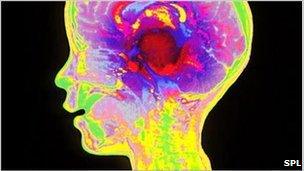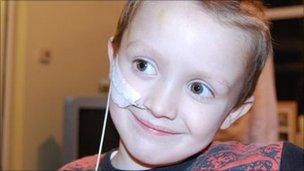Parents urged to be brain-tumour aware
- Published

Brain cancers can be diagnosed with a scan
A campaign is being launched to teach parents to look out for the warning signs of brain tumours - the leading cause of cancer deaths in children.
Brain tumours also leave two-thirds of survivors with significant disability.
A quarter of all child cancers occur in the brain. About 500 children and young people a year develop brain tumours.
Warning signs include fits, persistent or recurring vomiting and headaches, blurred or double vision, abnormal eye movements and deteriorating eyesight.
The child may also struggle with coordination and balance and experience tiredness or other behavioural changes.
The HeadSmart campaign is a joint venture by the Children's Brain Tumour Research Centre at the University of Nottingham, the Royal College of Paediatrics and Child Health and the Samantha Dickson Brain Tumour Trust.
Saving lives
Professor David Walker from the Children's Brain Tumour Research Centre said: "Brain tumours are fortunately rare, but they do happen, and it can be difficult for doctors to diagnose because the symptoms can often mimic less serious illnesses.
"Parents have no need to worry if their child occasionally experiences headaches, for example, but if symptoms come back frequently or are present for more two weeks or more, see your family doctor.
"The most important thing is that parents and family doctors know the symptoms of child brain tumours and make sure that possible cases are diagnosed as quickly as possible."
Mum Louise Pennell, from Wales, had to take her four-year-old son, Tom, to the doctors several times before he was diagnosed with a brain tumour.

Tom, now aged eight, needs regular checks on his progress
Tom's symptoms began with prolonged periods of high temperatures, followed by nausea, headaches and increasing urges to lie down, which indicate pressure on the brain.
After being told by the GP that her concerns were unfounded, Louise and her husband took Tom with them on their honeymoon to Disneyland.
But they soon knew something was very wrong and on returning from the US, Louise went directly to the GP, and then to a family optician who told them to "go to A&E immediately" after noticing some worrying changes in Tom.
After an overnight stay and examinations by consultants, Louise demanded to see an ophthalmologist, who eventually saw the pressure behind Tom's eyes and ordered the scan which led to his diagnosis.
Tom had two sessions of brain surgery and two years of chemotherapy at University Hospital Cardiff.
The tumour is still there but it has not grown. He now has check-ups every six months.
Louise says: "By themselves, the signs he had might not have indicated a brain tumour, it was the pattern of symptoms which was important.
"Parents and carers should not panic, but they do know their children better than anyone else. If you're concerned then get them seen by a doctor, and take them back if necessary.
"At best, it will turn out to be nothing, in which case you gain peace of mind - if it is a brain tumour then early diagnosis may save your child's life."
- Published5 June 2011